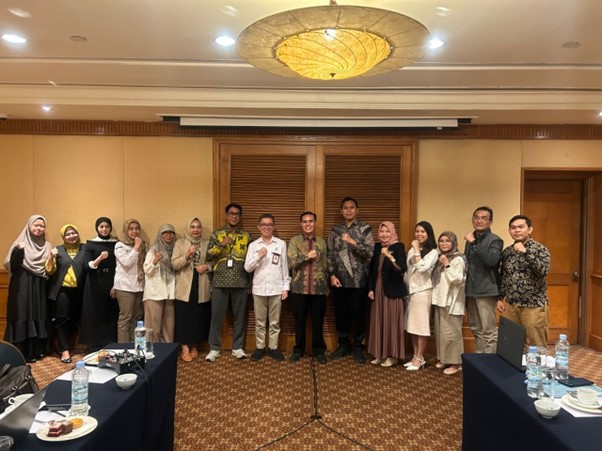AKKMI Discusses "Sustainable Compliance Program" With BPOM RI

Photo: AKKMI Meeting with BPOM RI
Jakarta – The discussion regarding the Sustainable Compliance Program for cosmetics manufacturing businesses cannot be separated from the regulations set by the National Agency of Drug and Food Control (BPOM RI). This program is a strategic step to ensure that every business player can meet the safety, quality, and sustainability standards in their cosmetic production processes.
Recognizing the importance of the Sustainable Compliance Program initiative for the future sustainability of the cosmetics industry, the Indonesian Cosmetic Contract Manufacturing Association (AKKMI) held an important meeting with BPOM on November 13, 2024, at the Aryaduta Hotel, Central Jakarta.
The meeting covered the presentation of the Sustainable Compliance Program and collaboration from the Head of BPOM, Dr. Taruna Ikrar, M.Biomed., MD., Ph.D., represented by Irwan, S.Si., Apt., M.K.M., Director of Traditional Medicine and Health Supplements Supervision.
AKKMI's Concern for Cosmetic Manufacturing Entrepreneurs in Indonesia
In the meeting, Halim Nababan, the Advisory Board member of AKKMI, expressed his concerns regarding the major challenges faced by cosmetics manufacturing businesses in Indonesia.
"Currently, the cosmetics manufacturing industry is facing several significant challenges, one of which is the influx of imported products into Indonesia. If this situation continues unchecked, the local market, which has been developing well, could gradually be eroded," said Halim Nababan.
Halim also pointed out the widespread presence of cosmetic products with exaggerated claims (overclaims) that do not comply with BPOM procedures in the market. This phenomenon is considered very concerning because it could affect consumer trust in local products. Furthermore, in an increasingly advanced digital world, information about these products can easily spread and go viral, followed by negative responses.
Halim explained that if this continues, it could backfire on local brand owners and manufacturing businesses that have adhered to proper procedures. These non-compliant products not only tarnish the industry’s image but also harm businesses that are committed to maintaining quality and complying with regulations.
BPOM's Efforts in Addressing Challenges Faced by Cosmetic Manufacturing Entrepreneurs
BPOM continues to strive to address the various challenges faced by cosmetics manufacturing businesses, both through independent initiatives and collaborations. Cooperation with associations in the beauty industry has proven to have a more effective impact in supporting the cosmetics industry in Indonesia. To date, BPOM has established strategic collaborations with several cosmetic associations, such as Perkosmi, PPAK, and Komindo, to promote increased compliance, quality, and competitiveness of local cosmetic products.
"This collaboration is an important step for cosmetics manufacturing businesses to meet regulations, improve product quality and safety, and implement a Risk Management Program (RMP) in the local industry," said Irwan, Director of Traditional Medicines and Health Supplements Supervision at BPOM RI.
In its implementation, BPOM helps educate the public on how to identify whether the products they choose are safe and of good quality.
Not only that, BPOM also provides technical guidance and supervision to ensure that industry players understand the applicable regulations and are able to implement them consistently. Additionally, BPOM encourages businesses to participate in certifications that support the strengthening of their product standards.
BPOM RI Supports AKKMI in Advancing Indonesia's Cosmetics Manufacturing Industry
BPOM has shown full support for AKKMI in promoting the advancement of Indonesia's cosmetics manufacturing industry. This support is realized through various strategic initiatives, including collaboration in programs to improve compliance and product quality in order to create an ecosystem that supports the competitiveness of local products, both in the domestic and international markets.
One form of collaboration that can be carried out between BPOM and AKKMI is the organization of an expo that connects potential buyers with OEM/ODM companies. BPOM has entrusted AKKMI to organize this event as part of efforts to strengthen the local cosmetics industry.
"Coordination for the expo next year may be entirely handled by AKKMI with full support from BPOM," he concluded.
The meeting was also attended by the Directorate of Prevention and Control, represented by Edi. During the discussion, it was hoped that a program would be developed to ensure that both government agencies and associations adhere to a code of ethics related to products on the market, as well as raising awareness about producing high-quality products.
Representatives from the National Drug and Food Control Supervision Development Center (P3MON) also expressed their support. They will assist the laboratories owned by contract manufacturing businesses, especially in terms of testing services.
The collaboration between BPOM and AKKMI is expected to create a synergy that has a positive impact on the development of the cosmetics manufacturing industry in Indonesia, while also strengthening consumer trust in local products.